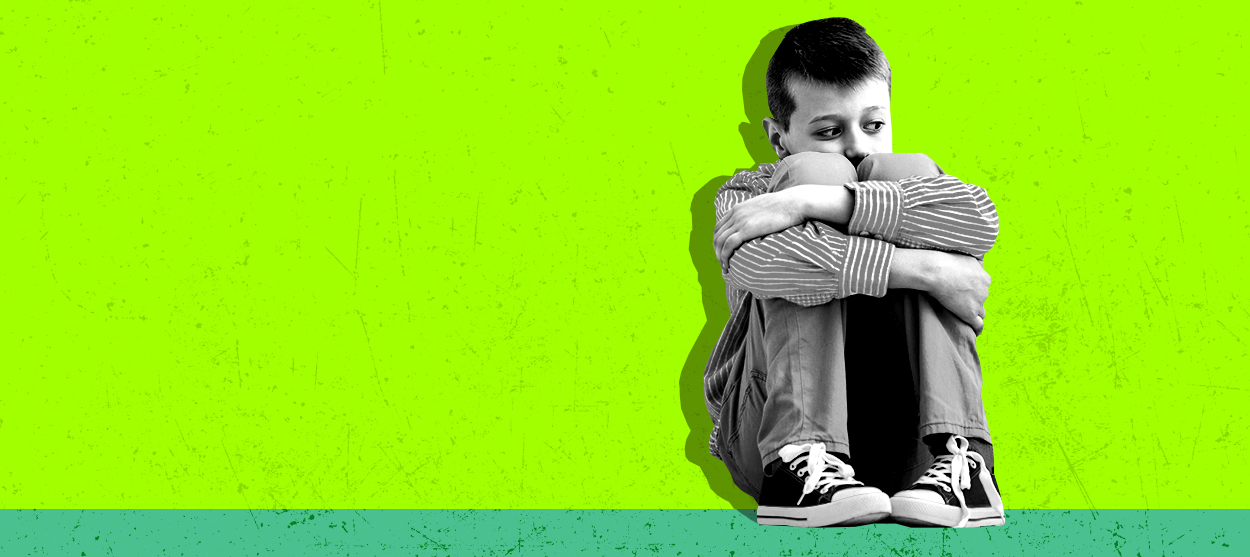Anxiety is different for kids
Here's what parents should watch for, and how to help


A free daily email with the biggest news stories of the day – and the best features from TheWeek.com
You are now subscribed
Your newsletter sign-up was successful
You know how to do CPR and have a fully stocked first aid kit. At home and in the car. But it's not enough. Today's parents need to know how to deal with their kids' mental health as well as their fevers and grazed knees.
According to statistics from the National Institute of Mental Health, around a third of adolescents have an anxiety disorder, which can come in various guises (including panic disorder, social anxiety disorder, obsessive-compulsive disorder, and separation anxiety disorder) and is characterized by excessive anxiety and related behavioral disturbances.
In the midst of what's arguably one of the biggest public health challenges of all time, we're all more aware of the prevalence of anxiety and other mental health issues, more clued-up about how mental illness can present itself, and what we can do to help both ourselves and others. But there's an important qualifier when talking about kids with anxiety: They don't display it in the same way adults do.
The Week
Escape your echo chamber. Get the facts behind the news, plus analysis from multiple perspectives.

Sign up for The Week's Free Newsletters
From our morning news briefing to a weekly Good News Newsletter, get the best of The Week delivered directly to your inbox.
From our morning news briefing to a weekly Good News Newsletter, get the best of The Week delivered directly to your inbox.
"Typically, when a child is anxious, you'll see a change in their behavior," says New York-based therapist Dana Carretta-Stein, M.S., LMHC, LPC.
That child could be the 8-year-old who throws the epic sort of tantrums you'd expect from a toddler. Or the 10-year-old who's snappy and irritable every single day, for no apparent reason. Or the 12-year old who gets a stomach ache every morning before school, without fail. It manifests itself in a range of ways, Carretta-Stein says. "While every child is different, some kids may become more aggressive (which is the fight in the fight/flight response), whereas other children may become very shy (the flight response)," she explains.
Kids with anxiety may be clingy or tearful, reluctant to go to school, take part in activities, or be separated from their parent, says Michigan-based therapist Carrie Krawiec, LMFT. They may have persistent headaches or stomach aches, or display obsessive-compulsive or rigid behaviors, like being in distress when something isn't a certain way or checking something over and over.
All behavior serves a function, Carretta-Stein notes, so changes in your child's behavior shouldn't be ignored. But that doesn't mean you react to it. Carretta-Stein prefers the term "mindfully respond." She teaches parents the "'STOP" technique to deal with a child with anxiety.
A free daily email with the biggest news stories of the day – and the best features from TheWeek.com
"STOP stands for Stop, Think, Observe, and Plan," she explains. "Stop and resist the urge to react to your child with emotion. It only adds fuel to the fire and will not help alleviate the anxiety. In fact, it can make it worse. Next, think about what your child is currently feeling. Then observe their behavior and consider what's at the root of the issue. Finally, plan how you would like to respond."
For many parents, that might be the difficult part. It's one thing to notice something is up; another thing to know how to try to make things better. But don't overthink it. Like most parenting matters, it's best to keep it simple.
"You could say to your child, 'I notice you're acting differently. Is something bothering you? Or are you nervous?'" Carretta-Stein suggests. "Even if you're wrong, it will help your child feel seen by validating their emotional experience."
Another parenting truth: Kids learn what they see. "Parents should evaluate their own anxiety and make sure they're not modeling any excessively anxious thoughts or behaviors," Krawiec says. "Of course, some anxiety is good, keeps us safe, and helps us to know right from wrong, but too much of it can be limiting psychologically, socially, and developmentally. Kids can learn anxious responses, and interpret anxiety, from their parent — trauma reactions can be passed through generations."
There's a name for this in psychology: social referencing. "This refers to the idea that children look to adults to understand how to regulate and manage their own emotions, says licensed clinical psychologist Melanie English, Ph.D., MSW.
"An adult might imagine being on an airplane with some turbulence; we might look around at other passengers to see if they are concerned or not with the turbulence," she says. "If those passengers aren't bothered we might feel fine; if we see others becoming upset, we might also feel upset. Like this example, our children will look to us to interpret a situation and how to react to it."
If parents can positively address the negative feelings they experience (anxiety, stress, conflict, etc.), they can mirror that for their kids — and you have a potentially life changing teaching moment right there. "Our children will inevitably see our anxieties, struggles, conflicts, bad days, and worst moods (welcome to life!), but we can identify and model to them why we might feel that way and how we handle it," English says. "In turn, they will understand that there are sometimes uncomfortable feelings and emotions in this world but there are tools to try and address them."
Like all mental health issues, anxiety is complex and can mirror other things, English adds. For instance, your child might think they feel anxious about an upcoming event, but they're actually excited. Or they might think they feel anxious about a test, but really they feel unprepared.
"Anxiety is typically future-based and can be addressed in kids similarly to how adults address it: talking it out, knowledge, self-care, having fun, exercising, creating structure, etc.," English says. "Encourage your child to describe what they are feeling, then try to come up with ways to reduce or eliminate that feeling."
Additional complications may be diet, lack of sleep, family problems, friend problems, health issues, and numerous organic, biological components. In those cases, English recommends exploring individual or family therapy (there are professionals who specialize in controlling for anxiety), medication, or other mechanisms.
And remember, asking for help does not mean you're an inadequate parent; it means you have your kid's back.
Want more essential commentary and analysis like this delivered straight to your inbox? Sign up for The Week's "Today's best articles" newsletter here.
Claire Gillespie is a freelance writer with bylines on Health, SELF, Refinery29, Glamour, The Washington Post, and many more. She likes to write about parenting, health, and culture. She lives in Scotland with her husband and six kids, where she uses every (rare) spare moment to work on her novel.
-
 Why is the Trump administration talking about ‘Western civilization’?
Why is the Trump administration talking about ‘Western civilization’?Talking Points Rubio says Europe, US bonded by religion and ancestry
-
 Quentin Deranque: a student’s death energizes the French far right
Quentin Deranque: a student’s death energizes the French far rightIN THE SPOTLIGHT Reactions to the violent killing of an ultra-conservative activist offer a glimpse at the culture wars roiling France ahead of next year’s elections.
-
 Secured vs. unsecured loans: how do they differ and which is better?
Secured vs. unsecured loans: how do they differ and which is better?the explainer They are distinguished by the level of risk and the inclusion of collateral
